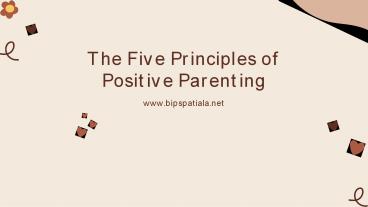The Five Principles of Positive Parenting - PowerPoint PPT Presentation
Title:
The Five Principles of Positive Parenting
Description:
The foundation of positive parenting rests on five principles: attachment, respect, proactive parenting, empathetic leadership, and positive discipline. These five principles go hand in hand to both build a strong bond and to position you to be the effective leader your child needs to guide him through childhood. – PowerPoint PPT presentation
Number of Views:114
Title: The Five Principles of Positive Parenting
1
The Five Principles of Positive Parenting
www.bipspatiala.net
2
Principles of Positive Parenting
3
- According to the attachment bond theory pioneered
by English psychiatrist John Bowlby and American
psychologist Mary Ainsworth, the bond (or
attachment) formed between primary caregivers and
infants is responsible for - Shaping all our future relationships
- Strengthening or damaging our ability to focus,
be conscious of our feelings and calm ourselves - Affecting our ability to bounce back from
misfortune.
- Attachment
4
As human beings, children deserve the same
consideration we afford to others. Children need
to be treated in a thoughtful, civil, and
courteous manner, just as we treat other people.
Research has shown that children who have loving,
nurturing parents grow a bigger hippocampus,
which promotes better memory, learning, and
stress response. Therefore, we respect a childs
mind when we are nurturing and positive. We
respect a childs body and dignity when we choose
not to hit her to cause deliberate pain for
training purposes.
2. Respect
5
Proactive parents address potential problem
behavior at the first sign before it becomes a
serious problem. We also understand that by
putting in extra time building the relationship
and teaching up front, we thwart many problems
that could have arisen from disconnection and
lack of knowledge and instruction. Proactive
parenting also means that parents respond rather
than react to their childrens behaviors. This
requires forethought into how one will respond as
well as a planned action. Whereas reactive
parents act impulsively, responsive parents are
in control of themselves and able to execute the
plan when a situation arises.
3. Proactive parenting
6
Not to be confused with permissive parents,
positive parents are still in the leadership
role. In fact, it is a gross disservice to
children to not give them competent leaders to
guide them on their journeys in this big, new
world. Being empathetic means we understand the
needs of our children and relate to them in a way
that helps them feel heard and understood while
still holding the boundaries we have set.
4. Empathetic leadership
7
Punishment is distinct from discipline. The goal
of punishment is to make someone suffer enough to
cause them to want to avoid that particular
behavior (and therefore punishment) again in the
future. The goal of discipline is to teach
someone to control impulses and behavior, to
learn new skills, and to fix mistakes and find
solutions.
5. Positive discipline
8
Conclusion
The foundation of positive parenting rests on
five principles attachment, respect, proactive
parenting, empathetic leadership, and positive
discipline. These five principles go hand in hand
to both build a strong bond and to position you
to be the effective leader your child needs to
guide him through childhood.
9
Thank You For Your Attention
Admission open 2022- 23
https//www.bipspatiala.net

